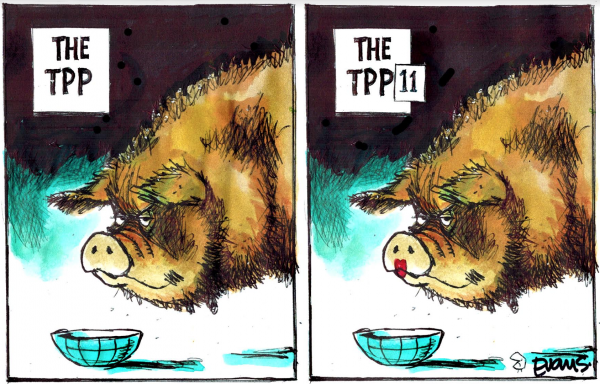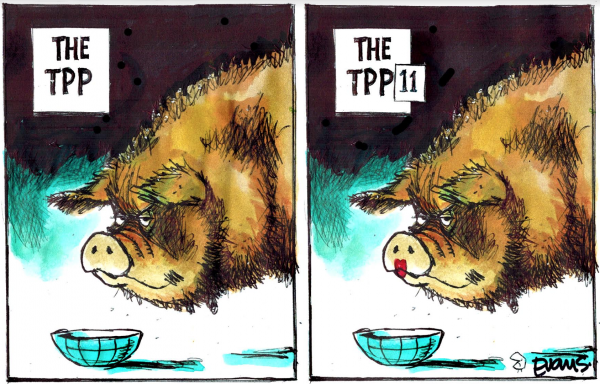
Regional Economic Development Minister Shane Jones wasted no time in condemning Air New Zealand’s decision to cut flights to Kapiti as he rightly argued that diminishing connectivity in provincial New Zealand was a huge obstacle for growth in the regions.
Jones made it clear that the government, as a majority shareholder, expected the airline to act responsibly by taking the public interest into account.
But the airline was just as quick to remind the minister of its commercial independence, which required it to put profit before people. They called it acting in the “interests of all shareholders” which, in corporate speak, means the same thing.
So who is right? Should there be moral limits to the markets? Should corporations be allowed to disregard the wider public interest and act only in the interests of their investors?
Surely Mr Jones is aware that the moment his own party agreed to sign the TPPA (Trans-Pacific Partnership Agreement now named the Comprehensive and Progressive Agreement for Trans-Pacific or CPTPP), they made their views on the above issue crystal clear.
By supporting the TPPA, NZ First, the Labour and the National party all said yes to protecting investors’ rights over and above the interests of an ordinary citizen.
Our Trade Minister David Parker agrees that despite the so-called side letters, the ISDS (Investor-State Dispute Settlement) clauses would still make it possible for corporations to take legal action against any government who, like Mr Jones, might think they can force corporations to prioritise social responsible.
I wonder if Mr Jones would dare employ the same threatening language against any of the giant multinational corporations the CPTPP would invite to New Zealand.
Surely he knows that half of the world’s countries have been sued by hundreds of corporations since year 2000 for actions they said threatened their profits.
The damages sought in some cases were in billions of dollars- enough to deter any government from even trying to get into a legal tangle with a powerful corporation.
It is now looking increasingly likely that the US will try to join the TPPA at some stage in the future and just as certain is the fact that they will use New Zealand’s good reputation to market the agreement as a progressive trade deal- good enough for New Zealand, good enough for the US.
Then, as the international trade expert Jane Kelsey tells us, it is very likely that Mr Trump would want to show off his superior deal making skills by demanding the reactivation of the suspended clauses of the TPPA and more.
Opening the doors to American multinationals will mean following the same path America has taken in commodifying the social as well as the economic life.
If you want to get a feel for how far economic markets can encroach on our everyday lives then you can do no better than to read Michael Sandel’s book on this very subject, titled: “What Money Can’t Buy: The Moral Limits Of The Markets”.
Sandel, a professor of government at Harvard University, offers many examples that clearly demonstrate how market thinking can easily cross the moral line and lead to shocking degradation of societal values.
Sandel mentions the “dead peasants” insurance policies.
Imagine taking out a life insurance policy on a person totally unrelated to you.
A lawsuit in the US revealed that Walmart had hundreds of thousands of such policies on its employees and enjoyed a small windfall whenever one of them died.
And how about the “viaticals”? A new market, where investors can invest in buying out life insurance policies of people with Aids.
Aids sufferers taking part in this scheme are offered a cash lump sum as well as payments for their treatment until they die- after which, the investors receive the full value of their life policy.
Sandel’s examples are not limited to the insurance industry. Students in the UK were encouraged by an advertising agency to rent out their foreheads for about $8 NZ dollars per hour for a temporary tattooed advertising space.
A single mother auctioned off her forehead for a permanently tattooed advertising space to pay for her son’s education. The winning bid, Sandel says, came from an online casino.
There is a charity that invites donors to contribute to reducing the birth of children to drug and alcohol addicted women by offering 300 US dollars cash incentive for every female addict willing to get sterilized.
And if you are a prisoner in Santa Barbara in California, you can pay to upgrade your cell for 82 US dollars per night.
You see, in a market society, there is almost nothing money cannot buy.
But- is this the sort of society we want to live in where values, ethics and social responsibilities do not count for anything?
Most of the problems with the CPTTP are well documented by the Greens but one of the lesser-known problems is that the CPTPP will reduce our democratic right to decide what role we want markets and money to play in our society. Under the CPTPP, the markets would make those decisions for us.
CPTPP will also act as a huge disincentive to explore new and innovative ways of achieving prosperity without growth at the time when the survival of our planet requires us to contain our appetite for constant growth.
It really is so disappointing to see Labour and NZ First joining the National party in championing this toxic agreement before we have had a chance to have a much wider public debate about its likely impact on shaping the future direction of our country.






Given that “our” politicians have already sold No Zealand to the Chinese dictatorship, the largest on planet Earth, why are you surprised and/or disappointed about the TPPA?
TREASON; parliamentarians swear an oath to uphold the authourity of the Crown & act in our nations best interests. All those that are party to ratifying this document are committing treason. Put them on trial &/or remove them from office.
Governments will continue to work hand-in-hand with corporations to maximise corporate profits because governments are dependent on corporate profits for their existence. Hence, major breaches of financial regulations by corporations ignored (or elicit miniscule fines), and governments continue to promote and sponsor wrecking of the environment.
https://www.theguardian.com/environment/2018/mar/28/extreme-fossil-fuel-investments-have-surged-under-donald-trump-report-reveals
‘The bulk of new “extreme” investments came in a doubling of loans and bonds to Canada’s government-backed tar sands industry, even though its success would be disastrous for climate mitigation efforts, according to the former Nasa chief James Hansen.’
The Adern government is no different from any other -except that the degree of deception and hypocrisy is greater.
“Governments will continue to work hand-in-hand with corporations to maximise corporate profits because governments are dependent on corporate profits for their existence. Hence, major breaches of financial regulations by corporations ignored (or elicit miniscule fines), and governments continue to promote and sponsor wrecking of the environment.”
Labour AND NZ First will have read the warnings by the business sectors and thus decided to sign the TPP-11 agreement, cow called CPTTP, as they knew that they would face massive attacks from business lobby groups, which would end up in the MSM and ensured that they would be a one term government.
Also has Labour talked about believing in GROWTH in exports, business and jobs, so it is like National hooked to the growth mantra, the quasi addiction to growth and more trade and consumerism, which is what neoliberalism promotes.
Any party that would dare challenge the status quo will at best only get a fraction or small percentage of votes in any election, as most people out there are also addicted to consumerism, and to living standards built on exploiting natural and mineral resources, largely powered by fossil fuel use, just look at how many people continue driving their combustion engine cars everywhere, also to the malls to spend their money earned through work dependent on this kind of economy we have.
Shaking things up, or making major changes would not come without a price, and one price would be loss of support of growth and consumerism addicted voters, the bulk of the brainwashed population, and it would not help any government stay in power.
Expecting people to give up cars, to give up the waste and pollute, throw it away lifestyle, that does not appeal to enough of the complacent, convenience loving, consumerist and selfish people within our society.
Therefore Labour knew the back lash would only be among the anti TPP activists and a small percentage of their supporters. They have decided to disappoint them, as it is in their eyes a small price to pay, because like National, they can win votes amongst the consumerist middle class, who think we need more free trade deals, like the TPP-11.
The ISDS is an aspect they are also not bothered with, not much at least, and the TPP-11 is also considered as a diversification of trading partners, creating a balance to over dependence on China.
So business as usual under this government, only some small symbolic gestures and nice slogan talk, a few more dollars due to increase in minimum wage, re-instatement of a right to tea breaks and union reps visiting work places, a billion trees or so, which may never materialise in such a number, ten thousand Kiwi Build homes that will not really be all that much more affordable and so forth.
Thanks Labour and NZ First, highly mediocre all this, I reckon.
Interesting how racist melissa lee praised RNZ when being interviewed by guyon the other morning saying how they are valuable service when I fact her government wanted to sell RNZ and anything else they could their grubby little hands on.
Great post. If you don’t want this happening – have your say!!
Don’t let our kids grow up in a depraved society where money can buy anything even a windfall from an employee that dies. (Good news Pike River).
https://www.parliament.nz/en/pb/sc/make-a-submission/document/52SCFD_SCF_ITE_76583/international-treaty-examination-of-the-comprehensive-and
Well done Donna,
100% and i cant understand why labour was so keen to sign up to this crazy deal that will wreck our future chances of keeping our sovereignty.
History will judge them badly now.
“They called it acting in the “interests of all shareholders” which, in corporate speak, means the same thing.”
In her book of the same name, Marjorie Kelly calls this attitude “The Divine Right of Capital”. You can read a summary here, and there’s a link to the full text of Kelly’s introduction:
http://wiki.p2pfoundation.net/Divine_Right_of_Capital
“Also has Labour talked about believing in GROWTH in exports, business and jobs, so it is like National hooked to the growth mantra …”
Funny then that they keep enacting corporatist policies like signing investor rights agreements (and euphemistically calling them “free trade agreements”). Because the international evidence makes it clear that this kind of ‘structural adjustment’ does not actually create economic growth, nearly as well as the more keynsian models of Scandanavian countries. The notion that austerity, privatization etc always leads to economic growth must be challenged and debunked every time the claim are made. This piece is long, and pro-capitalist in a cautious, liberal way, but also nuanced, thoughtful, and worth the time:
https://www.theguardian.com/news/2017/nov/14/the-fatal-flaw-of-neoliberalism-its-bad-economics
Comments are closed.